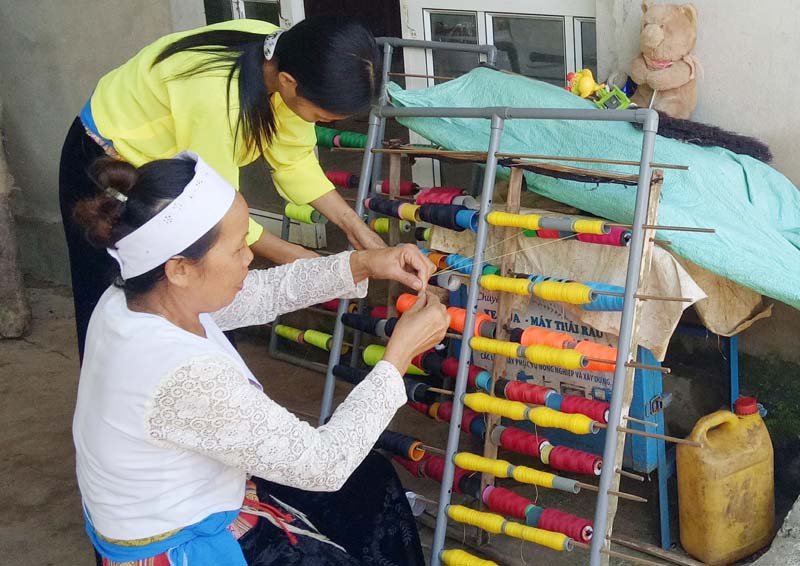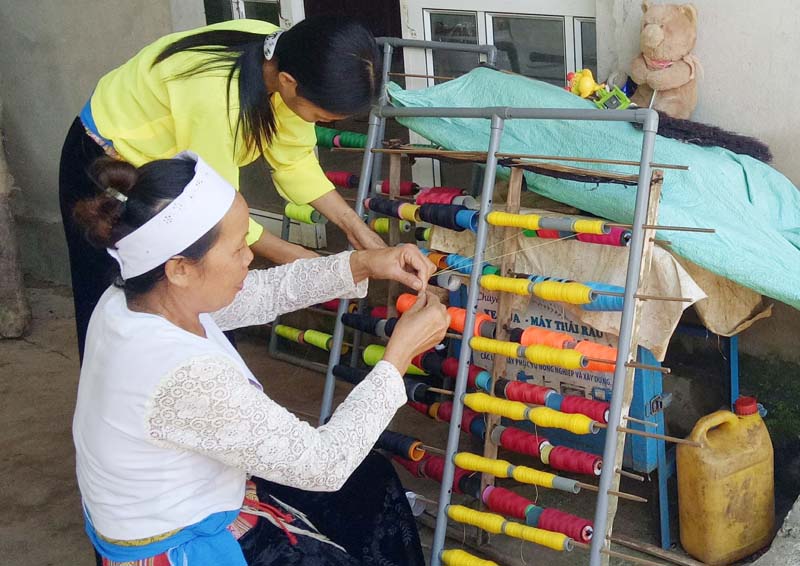
(HBO) - The program "One commune (OCOP) - one product” is directed to implement drastically by Lac Son district. It is considered as a key task in the new rural construction and restructuring the agricultural sector.
 Luc Nghiep Thanh brocade co-operative, Yen Nghiep commune (Lac Son) has restored and developed the traditional brocade weaving, contributing to creating jobs and income for leisure workers.
Luc Nghiep Thanh brocade co-operative, Yen Nghiep commune (Lac Son) has restored and developed the traditional brocade weaving, contributing to creating jobs and income for leisure workers.
Implementing the policy of the province to build "One commune - one product", Lac Son district has issued a plan to implement, propagate and encourage the economic organizations in the areas of communes and towns to participate. The district has directed the communes and towns to build the specific products ensuring some criteria such as the advantages of origin, the local strengths and the products must be sustainable.
Accordingly, in the period of 2018-2020, Lac Son district has registered 5 products: Lac Son seeds from Michelia tonkinensis of the Michelia tonkinensis supplying cooperative and the Agricultural Service of Chi Dao Cooperative; Luc village’s brocade weaving of Agricultural Cooperative and
Luc Nghiep Thanh brocade weaving in Yen Nghiep commune; Lac Son chicken of the Hill Chicken Raising Cooperative in Huong Nhuong commune; Lac Son oranges of the Growing and Consuming cooperative in Oc, Thuong Coc communes; Mu-Lac Son waterfall ecotourism in Tu Do commune. In particular, Lac Son seeds from Michelia tonkinensis were the first agricultural product of the district to be certified as a collective mark in 2015.
For orange products, the area of citrus fruit in Lac Son district increased sharply in the last 5 years. By the end of 2018, the whole district had 683 ha, of which the area of oranges was 357 ha. Huong Nhuong Hill Chicken Cooperative is mainly raising the native chicken and Son Tay Mia chicken with a scale of more than 10,000 breeds. Currently, Lac Son chicken collective brand is waiting for recognition. There are 500 looms for traditional brocade products in Yen Nghiep commune. Each year over 50,000 brocade products such as skirts, shirts, hats, towels are produced to serve the needs of people in the area and in the surrounding ones. The recognition of the traditional handicraft villages in brocade weaving has motivated women to become more attached to the profession.
With a wild look, Mu Waterfall - Tu Do commune has been a tourist destination attracting domestic and foreign tourists in recent years. In 2017, the chairman of the People's Committee of the province recognized and ranked the provincial relics. In 2018, there were about 30,000 turns of visitors and tourists paying a visit to the district, of which there were 1,000 turns of foreign visitors. The revenue from tourism services reached over 6 billion VND, creating jobs and stable incomes for over 100 local laborers, contributing to promoting the socio-economic development.
In 2019, the district has developed a plan to continue implementing and promoting propaganda of the local products, encouraging the economic organizations and cooperatives in the area to continuously participate in implementing the OCOP project in the next years.
According to data from the Hoa Binh Provincial Party Committee, the industrial production index for the first six months of 2025 is estimated to have increased by 20% compared to the same period last year. This marks the highest year-on-year growth rate for this period since 2020.
In the first six months of 2025, Hoa Binh province’s export turnover was estimated at 1.145 billion USD, marking an 18.11% increase compared to the same period in 2024. Import turnover was estimated at $ 804 million, a 17.15% increase, which helped the province maintain a positive trade balance.
The lives of the ethnic minority farmers in Tan Lac district have gradually improved thanks to the new directions in agricultural production. This is a testament to the collective strength fostered through the professional associations and groups implemented by various levels of the district’s Farmers’ Union.
With the motto the "product quality comes first,” after nearly one year of establishment and operation, Muong village’s Clean Food Agricultural and Commercial Cooperative, located in Cau Hamlet, Hung Son Commune (Kim Boi district), has launched reputable, high-quality agricultural products to the market that are well-received by consumers. The products such as Muong village’s pork sausage, salt-cured chicken, and salt-cured pork hocks have gradually carved out a place in the market and they are on the path to obtaining the OCOP certification.
In the past, the phrase "bumper harvest, rock-bottom prices" was a familiar refrain for Vietnamese farmers engaged in fragmented, small-scale agriculture. But today, a new spirit is emerging across rural areas of Hoa Binh province - one of collaboration, organisation, and collective economic models that provide a stable foundation for production.
Maintaining growing area codes and packing facility codes in accordance with regulations is a mandatory requirement for agricultural products to be eligible for export. Recently, the Department of Agriculture and Environment of Hoa Binh province has intensified technical supervision of designated farming areas and packing facilities to safeguard the "green passport" that enables its products to access international markets.



 Luc Nghiep Thanh brocade co-operative, Yen Nghiep commune (Lac Son) has restored and developed the traditional brocade weaving, contributing to creating jobs and income for leisure workers.
Luc Nghiep Thanh brocade co-operative, Yen Nghiep commune (Lac Son) has restored and developed the traditional brocade weaving, contributing to creating jobs and income for leisure workers.